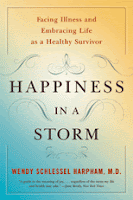
When you are expressing a challenge to a friend or family member, what do they say? Do they try and fix it, minimize it, or change the subject to themselves or do they respond as suggested by Wendy Harpham M.D. by saying,
"I HEAR YOU AND I AM HERE.
Today as I celebrate the 1 year anniversary of the severe flare up that I had of my autoimmune disease, I received a new blog posting from Wendy Harpham's blog. This woman knows all about challenge, adversity and HOPE. She was diagnosed with cancer at an age when she was the mom of young children, a practicing physician and in the prime of her life. The multiple recurrences that she experienced caused her to close her practice and to wonder where this journey was going to end. She courageously tried a number of treatements and shifted her focus to writing at home both for her own healing and rest and to make a difference to those travelling journeys like hers. She has a unique opportunity to do that as she has seen the journey of cancer from both sides of the bed. She is now a successful author and writes books that help physicians understand how to be with patients in some of the most challening experiences of their life and ones that support patients to find their way to being a "healthy survivor". Her cancer is now in remission and she is able to travel the world delivering her message of HOPE to health professionals of all kinds. Her messages always include real life strategies to find healthy hope in the midst of life's challenges. I love what she has to say and encourage you to take time to read the postings on her blog. Her blog is
www.wendyharpham.com
For me, I am celebrating this past year. My health is much improved although certainly not exactly what I had hoped for. I can see, however, how much I have grown in this past year in so many different ways. The most significant thing I have learned is how to simply sit in the midst of adversity and allow myself to
feel it. It is so easy to minimize it, distract myself away from it, hide how I am feeling from others, and simply press on with my life. I have made a conscious and deliberate choice this year not to do that. I have, instead, allowed the multitude of feelings I have felt to surface and simply sat in the experience of them. I have discovered that when I give them space, they hang around for a while and then the energy disapates and I can get on with my day. I sit quietly every morning in the lovely ritual of centering prayer and allow myself to quietly "rest in God". This practice enriches my day and my life. My story still isn't easy but I am so much better able to connect to healthy hope.
Wendy Harpham's blog posting speaks about the topic of support as we all share the stories and experiences of our lives. What about you? Do you keep it inside and pretend that you are "fine" so you don't burden other people with your problems? Do you press on in your life and deny that your experiences are as difficult as they really are? Do you have people in your life who will answer "
I hear you. I am here." when you share your journey with them? Having people who are able to listen deeply to your story and respond with a positive "You are not alone. I am here" makes a huge difference. Cultivate those relationships in life so that when you need a hand someone will hear you and offer a little support. Remember, too, to say the same to the people in your life. Don't try and minimze their problem, tell them you're sure it will turn out fine, or simply walk away or change the subject because it feels too challenging for you. Offer what support you can in the midst of your own busy life and trust that others will do the same for you.
I am going to rewrite Wendy Harpham's blog posting here rather than include only the link because I think it is so well written. Read it and ponder how it might apply to your own life and circumstance.
Taken from Wendy Harpham's blog posting on Friday, February 4, 2010
A natural response to people who confide that they've been diagnosed with a disease (or that they are afraid of dying, are worried about getting through treatment, or are feeling any other unpleasant emotion), is to empathize and try to lift their spirits.
Unfortunately, the response that comes naturally may not be the most helpful to someone who wants to be a Healthy Survivor.
The expression of unpleasant thoughts and feelings is how Healthy Survivors (1) signal they have a problem or (2) respond to a problem.
With this in mind, a healing response often begins with some variation of this: "I hear you. I'm here for you."
If people share with you that they have been diagnosed with a disease, instead of saying you are sorry or that it'll turn out fine, consider saying, "Thanks for letting me know. I will be here for you whatever way you want me to be here."
If people share a fear or two, instead of trying to minimize the danger or bolster their confidence, try saying, "Yes, that is frightening. I'll walk with you, whatever happens."
If they share a weakness, you can say, "That's okay. Because you don't have to do this alone."
"I hear you. I am here."


